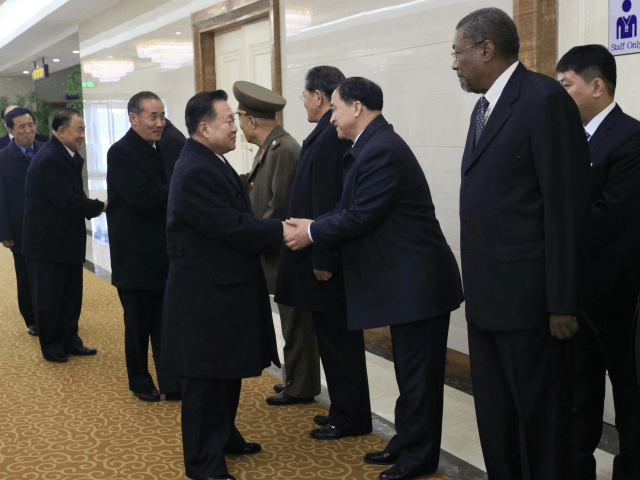North Korea sent its vice chairman of the Central Committee of the North’s Workers’ Party Choe Ryong-hae, considered second in power only to dictator Kim Jong-un, to Cuba this week to reinforce bilateral ties as denuclearization talks continue with the United States.
North Korea and Cuba have long been close allies with strident communist, anti-American authoritarian leadership. Kim has sent envoys to Cuba repeatedly before high-profile meetings with American diplomats, including Secretary of State Mike Pompeo, and North Korean state media have been careful to regularly tout the greatness of the two nations’ friendship. This latest visit follows the publication of several reports suggesting that Pompeo is preparing yet another trip to North Korea in the near future.
South Korean outlet Yonhap speculated following the publication of the meeting that Pyongyang may be looking to involve Cuba in denuclearization negotiations with the United States, notable given that China has long played the role of main guarantor and ally in these talks.
The Cuban state-run propaganda outlet Prensa Latina announced on Thursday that Choe was in Havana to meet with first Vice President Salvador Valdés and Foreign Minister Bruno Rodríguez.
“The meeting occurred in a fraternal atmosphere during which the visitor and Rodríguez ‘agreed to highlight the bonds of brotherhood and fraternity that unite peoples, parties and governments,” the outlet claimed. Granma, the official newspaper of the Cuban Communist Party, added that Choe and Valdés “acknowledged the excellent state of relations between our peoples, parties, and governments,” but did not elaborate on the details of what Choe discussed with his Cuban counterparts.
“The successive visits to Cuba by top North Korean officials are seen as part of Pyongyang’s efforts to cement relationships with its socialist allies amid the world’s rapidly changing diplomatic environment, watchers say,” Yonhap reported. “They also speculate that Pyongyang may use Cuba, whose relations with the U.S. have recently been strained under the Trump presidency, to put pressure on Washington to declare the end of the Korean War.”
Cuba, as a rogue state with little at stake in east Asia, has played at most a minor role curbing North Korea’s belligerent behavior, serving instead as a steadfast ally of its fellow dictatorship. Yet it would not be the first time that the possibility of a growing role for the island nation in denuclearization discussions would come up. In December, Canadian Prime Minister Justin Trudeau – a longtime personal family friend of the Castros – suggested that Cuba could serve as a negotiating partner to ease North Korean concerns with denuclearization.
“I’ve had surprising conversations with places you wouldn’t expect, including places like Cuba, where they actually have … decent diplomatic relations with the North Korean regime,” Trudeau said at the time. “And can we pass along messages through surprising conduits? There hasn’t been huge amount of discussion around that, but it was a topic of conversation when I met President Raul Castro last year.”
Trudeau’s suggestion was largely ignored and, since then, President Donald Trump has met with Kim personally, sidelining both potential negotiators like Cuba and North Korea’s most prominent ally, China. North Korea has nonetheless continued to pursue close relations with the Castro regime. Prior to Choe’s visit, North Korea sent high-ranking officials to Havana shortly before Pompeo arrived in Pyongyang, leading to some speculation that Pyongyang was consulting Havana on how to handle American diplomats. North Korea’s foreign minister was in Cuba most recently in November.

COMMENTS
Please let us know if you're having issues with commenting.